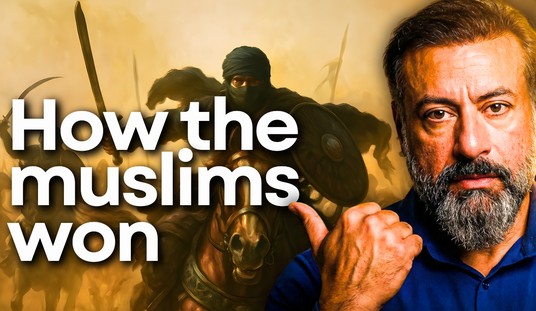Conservative media stars have gotten good mileage out of elite bashing. Sarah Palin, Rush Limbaugh, and Glenn Beck, who together reach tens of millions through radio, TV, and New York Times bestselling books, have argued robustly that our elites are arrogant, insulated, and obtuse. To a significant extent, the conservative media stars are right.
Overall, their sweeping indictment, which inspired a good deal of Tea Party activism, has been good for democracy in America. By rousing large numbers of citizens of differing political inclinations last November to demand more effective and responsible representation, the indictment served the cause of self-government.
But dwelling on the vices of contemporary elites can also present dangers to the cause of freedom. For all the salutary attention it has focused on the American founding and Beck’s propulsion of Friedrich Hayek’s 1944 classic The Road to Serfdom to the top of the Amazon bestseller list in June 2010, the contemporary critique of what Angelo Codevilla calls “the ruling class” can cut too crudely. It frequently runs the risk of obscuring the dependence of constitutional democracy in America on the cultivation of excellence.
Elites — persons of the highest class or groups controlling the reins of political power — are a common feature of social and political life. They are inevitable in free societies, which make a priority of giving individuals the opportunity to develop their varying talents and to cooperate for mutual benefit.
Unfortunately, it is far from inevitable in free societies that those gifted in acquiring power will be the wisest and most adept at exercising it. Yet today more than ever conserving liberty and maintaining democracy require an elite whose members possess advanced learning, professional expertise, and wisdom born of extended experience.
As House Budge Committee Chairman Paul Ryan’s Roadmap for America’s Future 2.0 demonstrates, effectively tackling our major domestic challenges — job creation, taxes, health care, Social Security — will depend on policy analysts and economists of the highest caliber delving into and making sense of the intricate details of a multi-trillion dollar federal budget and then finding ways to curtail spending while providing for fundamental governmental responsibilities and maintaining essential services.
As General — and Princeton PhD — David Petraeus proved in devising and implementing a winning counterinsurgency strategy in Iraq well after the supposedly best and brightest concluded that all was lost, refined knowledge of the history, culture, religion, and everyday material needs of our allies as well our adversaries is vital in the struggle against Islamic extremism.
As the Obama administration wrestles with questions concerning targeted killings, the detention facility at Guantanamo Bay, and trials in federal court of enemy combatants, it seems to be learning that in the continuing struggle to balance liberty and security while defending the nation against jihadists and other transnational terrorists, proper application of the law of armed conflict calls for lawyers not only superbly trained in the conventional areas of constitutional law but also well-versed in military affairs.
And, as the disgraceful attempt — first without a shred of proof, then in defiance of overwhelming evidence — by progressive journalists to blame the Tucson shootings on Palin, Limbaugh, Beck, and Tea Party activists reminds, to form reliable judgments citizens need tenacious journalists who are trained to respect their primary and overriding professional obligation, which is to report the truth.
To obtain the elites we deserve, nothing is more urgent than redoubling reform efforts at all levels of education — returning to the fundamentals in K-12; renewing science, engineering, and liberal education at our colleges and universities; and replacing the inculcation of progressive shibboleths in graduate and professional schools with assiduous study of craft.
Our popular conservative critics of elitism, however, place the emphasis elsewhere. Their rhetoric revolves around returning power to the majority of Americans by limiting government in accordance with the proper understanding of the Constitution.
The majority are ordinary people who live real lives, self-made men and women who did not attend the nations top forty or fifty colleges and universities; who pay their taxes, live within their means, and save for the future; and who prefer to avoid politics because they lack a desire to tell other people how to live their lives but in recent years have entered the political fray in increasing numbers to oppose a federal government determined to tell them how to live theirs.
It is around these ordinary people’s common sense and commitment to the Constitution as originally understood that Palin, Limbaugh, and Beck have sought to build a reform movement. It is an excellent beginning. Indeed, the nation cannot get enough of what the former governor of Alaska calls “common sense conservatism” or “constitutional conservatism.”
But such will not suffice. Neither the return to common sense nor the reclaiming of constitutional essentials will solve the vexing and complex public policy challenges we confront. To put millions back to work, control runaway spending, re-reform health care, meet our growing energy needs, protect the homeland, find the right course in Egypt, check Iran, compete with China, and foster an international order ever more favorable to freedom calls for the cultivation of excellence in a new generation of leaders.
This is a matter of common sense and of constitutional conservatism.
History teaches that ideas must play a leading role. The great renewal of conservatism in post-World War II America is unthinkable without outstanding intellectuals. Critical, along with Hayek’s writings on economics were, among other contributions, William F. Buckley’s synthesis of traditionalism and constitutionalism, and Irving Kristol’s pugnacious determination to bring philosophy and social science to bear on the problems of public policy. As Ronald Reagan, who appointed William Bennett secretary of education and Lynne Cheney chair of the National Endowment of the Humanities, well understood, ideas have consequences and American education should prepare citizens to appreciate them.
The rise over the last three generations of conservative thinkers determined to restore America’s constitutional tradition, moreover, reflects the importance the constitutional tradition itself attaches to intellectual excellence. Educated to a degree that is today difficult to comprehend, America’s founders believed — and demonstrated through their remarkable political handiwork — that a proper understanding of the principles of self-government and the ability to meet the challenges of the day rested on intimate knowledge of the classics and of the moderns as well as first hand experience of governing and commerce.
In a letter of Oct. 18, 1813, to his friend and great rival John Adams, Thomas Jefferson registered his agreement that “there is a natural aristocracy among men.” But in contrast to the “artificial aristocracy, founded on wealth and birth,” it was grounded in “virtue and talents.” Jefferson considered this natural aristocracy, which paradoxically depended on the human capacity for discipline and education, “the most precious gift of nature” for the preservation and improvement of social and political life. “May we not even say,” he wrote, “that that form of government is the best, which provides the most effectually for a pure selection of these natural aristoi into the offices of government?”
From Jefferson’s perspective, our elites deserve rigorous criticism. But we mustn’t stop there. To meet Jefferson’s challenge, we must go beyond criticism to the cultivation of those many and varied excellences of mind and character that enable citizens in and out of government to advance the cause of liberty.









Join the conversation as a VIP Member